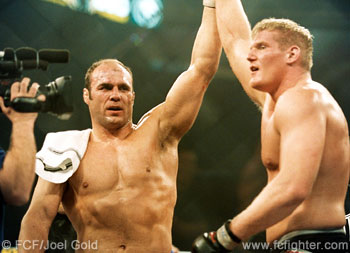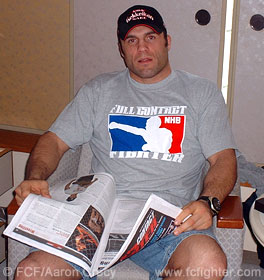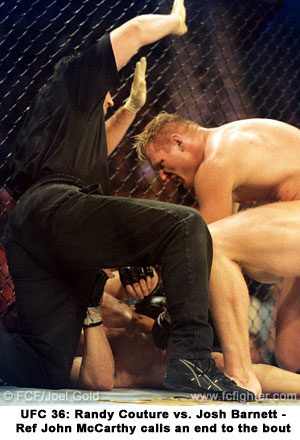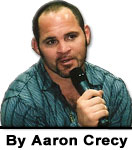| VISIT THE REST OF OUR SITE BY CLICKING THESE LINKS | |||||
| SUBSCRIBE | FCF SHOP | HOME | PICTURES | VIDEOS | FCF TV SHOW |

 FCF: It was recently reported that Josh Barnett failed his drug test after UFC 36. What is your initial reaction to that news?
FCF: It was recently reported that Josh Barnett failed his drug test after UFC 36. What is your initial reaction to that news?RC: My initial reaction is, what is that going to do to the sport? It doesn't change the fact that I lost that fight, and that's all that is really important to me -- how I competed in that competition. What he does is of no consequence to me. If he chooses to take shortcuts... whether or not it's true, I mean, I don't really know. FCF: But if it is true? RC: I competed in a sport where that was reputed to be occurring in all the Eastern Bloc and former Soviet countries. We competed against them all the time and certainly we had plenty of successes. That's their choice, and all I can really concern myself with is how I compete and how I prepare myself. So I'm not going to get pissed off or caught up in that whole deal because I can't affect it -- it doesn't make any difference to me. FCF: What is your personal opinion on steroids and performance-enhancing drugs? RC: I don't agree with them. You can call it cheating or taking shortcuts or whatever you want, but I don't see how you can feel... at least my opinion is, how you can feel good about being victorious or about being a champion if you know you had to enhance what God gave you by using drugs to get there. Personally, I'm against it. The risks outweigh the possible gains, in my opinion. FCF: Were you aware as a UFC athlete that you would be tested for steroids? RC: I think that's one of the things that surprised me coming from the Olympic movement and the testing procedures that the USOC [United States Olympic Committee] and the IOC [International Olympic Committee] put you through to the first time I fought in the UFC and I had to do a drug test. There was a lack of protocol, or at least a glaring difference in the protocol between the USOC protocol and SEG's protocol. I asked what they were testing for and if they were testing for anabolics. I was told that they were testing for they considered performance-enhancing drugs like speed or cocaine or things like that, but not for anabolics. That struck me as very, very odd because if you are going to test for things that are potentially enhancing someone's performance, why would you leave that group of drugs out of the equation. That was the stance then. What I didn't realize was that the Nevada State Athletic Commission changed its policy and started, as of January, testing for anabolics as well. And I don't know that any of the athletes knew that. Obviously we all know that New Jersey and Nevada require testing and the Commissions conduct the test. There was certainly a lot more protocol than SEG used to use back in the day -- they would throw you a cup in the trailer and tell you to go pee in it. At least they had an official there who followed you into the restroom and recorded the data and handled the urine and everything with some sensitivity. You saw that it was packaged and sealed and taken care of in a professional manner. It was still reputed that a lot of guys were using steroids and they seemed to pass their drug tests in the past. Now, all of a sudden somebody doesn't and I think that is due to the change in their policy, that as of January they started testing for anabolics, too. FCF: Was there any official notification of what you were being tested for, to the best of your knowledge? Were you or your managers ever given a list of banned substances by the Nevada State Athletic Commission or by the UFC? RC: No, I don't believe we were ever given a list. It's stated in your bout contract that you are going to be tested. It just says that you are going to be drug tested. It doesn't really say... it just says you are drug tested. I guess it's up to you whether you inquire as to what is on their banned substance list. Obviously, as an athlete who competes with asthma and coming from my background where I've been tested before, I wanted to know what was on that list. What do they consider a banned substance and what is a restricted substance? So I made inquiries and found that information out, but it wasn't something that was given to me. You certainly can ask and find out that information, which I guess is your responsibility. FCF: Based upon your bout contract, what, if any, penalties are you aware that there might be for failing the drug test? RC: The only penalty that I'm aware of that comes from the Athletic Commission is that they are going to withhold ten percent of your purse until you pass your drug test. And they do that right after the fight when they give the test. When they pay you, that say, "This is your purse, less the 10 percent that we hold until we get the results of your drug test back." Outside of that, they don't say anything about what is going to happen if you come up positive or any of that. You'll just be notified, basically. FCF: Have you ever used steroids or any type of banned performance-enhancing drugs at any time during your amateur wrestling or professional fighting careers? RC: No. I never have. I've seen guys that have done it -- guys who were on the lower echelons of wrestling, who hadn't been up into the National Team ranks and weren't being tested on a regular basis. I've seen both sides of that, the effects mentally and physically that it had on them. That's just one more reason why I was sure it was something I didn't want to try. Besides, there's the fact that I was in a weight class sport and trying to maintain my weight and stay within range of my weight class. FCF: Has there been any temptation as a professional fighter where sometimes you face guys 20, 30 or even 40 pounds heavier than you who, until January, were not being tested for steroids? Doesn't being clean put you at a disadvantage? RC: I made a decision a long time ago that it was something that I wasn't going to do and I stood by that decision. Early on as I was a developing athlete you hear about those sorts of things, you see other athletes who are making these huge gains in strength and performance and you know that they are using those sorts of things. At that time you are forced to deal with that and decide where you fall -- whether you are going to use and not use. I made that decision a long time ago and that carried right on into my fighting career. I often looked at the guys in the fight game who were using steroids and it seemed to me that although they were very powerful, that their endurance and their ability to compete over the long distance of a fight were hampered by the added muscularity and vascularity that comes from using steroids. So, I almost looked at it as an advantage against those guys. I know there are different kinds of steroids and if a guy is properly training for a fight anyway they are going to help him recover and help him train harder. But most of the guys that did it were into how they looked and wanted to have big, intimidating muscles, and those don't necessarily translate into great fighting. So, guys that looked like that or had that stereotypical steroid look, I saw it as an advantage as a natural athlete to go out and compete against them because if you pushed the pace, they were going to blow up -- they weren't going to compete over the long distance of the fight. FCF: If you were to assume that the NSAC's test results are accurate, would you be surprised by that news? Being from the Pacific Northwest where you are around Josh and the people he trains with, had you heard any rumors of steroid use? His body composition has changed quite a bit in a short period of time. RC: I don't know if I want to comment on that. There are a lot of people involved who I still have working relationships with, so I prefer not to comment on what I believe to be true or not true. And again, it doesn't really matter to me. What really is important to me and what I have to focus on is my performance and my execution and training and gameplan in that fight. And whether they choose to strip Josh or whatever they decide to do with Josh -- Zuffa and the Nevada State Athletic Commission -- it still doesn't change that fact. So, they can hand the title back to me and say it was a no contest or whatever and it's still not going to change the fact that I feel like I lost that fight and didn't perform as well as I wanted to perform.  FCF: If the allegations prove true, would it make you bitter at all to find out that, for all intents and purposes, you lost to a guy who cheated?
FCF: If the allegations prove true, would it make you bitter at all to find out that, for all intents and purposes, you lost to a guy who cheated?RC: Again, I don't choose to focus on that. I could look at it that way and be pissed off at Josh -- that's assuming what they say is actually true -- but I don't choose to focus on what other people are doing. I have to focus on what I'm doing and how I competed and how I performed. Because really that's the only thing I have control over. FCF: Is it possible that Zuffa could have leaked this information or even fabricated it as part of an elaborate negotiating ploy? [as we have heard people say] It has been rumored that Barnett asked for an exorbitant amount of money for a new contract. RC: I think anything is possible. Is that within the realm of possibility? Certainly. I don't know that an entity such as the Nevada State Athletic Commission -- even with the ties that Zuffa has with that commission -- I don't know that they would be approachable or could be affected by Zuffa in that way, that they would falsify the test just to help Zuffa out with negotiations or to help discredit Josh. It's my opinion that it's certainly within the realm of possibility, but I don't think that it would happen. FCF: If Josh does not return to the UFC, logic would suggest that you would compete for the vacated title in London at UFC 38. What are your thoughts on that possibility? And who are some of the potential opponents? RC: I think that's probably the most logical course of action if they decide to strip Josh of his title. I don't think they're just going to call it a no contest and hand the title back to me. Even if they call it a no contest, they can't erase the fact that the title changed hands. I don't want the title back under those circumstances anyway -- I would rather compete for it. So, I think the most logical thing to do if that occurs is to have a fight between who they consider to be the two top contenders for the title. I certainly think I'm in a position to be in that fight. I think there are three or four other guys who, depending on how things wash out in the next UFC, could be considered. Ricco Rodriguez against TK is a very interesting competition, so we'll see how that comes out. Pedro Rizzo is still around and is still one of the top competitors. You could conceivably see Couture-Rizzo III -- I don't know! So, it will be interesting to see how all that washes out. I'm just going to train and compete and be ready to go. FCF: Anything you plan to do differently coming off a loss? Are there any particular lessons you took away from your fight with Barnett that you will carry with you into your next fight? RC: I think there are two things. I have to find bigger training partners who challenge me. I think I work out with a bunch of great, physically gifted training partners, but that weight difference, that size difference of this new generation of heavyweight like Josh and Ricco who are not only big, physical guys but also have skill that you have to be able to deal with. I have to find training partners who can simulate that a little better. And the other thing is mentally to try and stay focused on what's important. Not to get caught up in a lot of other things that are going on in my life and really try and get away and really stay focused on the fight at hand. I think that those are the two things that didn't go the best that they could have before this fight. FCF: You and Josh have a friendly relationship, and on occasion you even work with his trainer, Matt Hume. He stated at the post-fight press conference that he has a great deal of respect for you. Would this at all impact the level of respect that you have for Josh Barnett? RC: I don't think that will change. Josh is a great competitor, but he's young and sometimes when you're young you don't make all the best decisions. If this is true it would probably be an example of that. Looking at the long term and his longevity in the sport and the potential damage that this could do to the sport, I think that maybe it wouldn't have been the best decision on his part. But that doesn't change how I feel about Josh as a person or Matt Hume and his school or any of those things. They're still the same guys as they were before this incident. FCF: What is the potential damage that this incident could have on the sport? And if you were in Zuffa's position, what type of consequence would you impose? RC: They're in a position to really take a stand on something that certainly in our society is not seen as a positive thing or is an accepted thing -- the use of steroids. On one hand, you see a lot of NFL players, a lot of WWF stars and a lot of bodybuilders who, for their physiques and abilities, are highly touted and greatly respected in our society. But there is kind of that dark part that our society tends to overlook until it is brought into the forefront -- then, it's always a negative thing. Our sport is struggling as it is. We need all the positive things that we can muster to keep things headed in the right direction. Potentially this kind of media attention could damage the sport by placing yet another stigma on out sport that we don't need and that I don't think we deserve, either. FCF: How do you feel Zuffa and the NSAC should handle the case of someone who fails a drug test? RC: Well, maybe it should have been a little more aggressively publicized that steroids are now being tested for, because I think guys have gotten away with it in the past. Now all of a sudden it comes out that it's not okay, that they're not going to get away with it and that there are going to be some repercussions. Maybe if it's just a 10-percent fine, that's not really that big a deterrent for a lot of guys. They're in a position -- Zuffa is in my opinion -- to make a statement about where they stand. If it's just to slap a 10 percent fine on the athletes who do that and come up positive, that's not a very strong statement and I'm not sure that it damages the sport or not. But they could come out much stronger than that. When they start talking about stripping titles and things like that, it's similar to USOC and IOC bans of athletes for a number of years and taking their medals away and that sort of thing. It's a very devastating thing and a very public thing. And I think most people have a lot of respect for the organizations that stand up and do that and say, "This is not acceptable. We're not going to allow this -- we're not going to allow one of our champions to hold the title doing this." With that regard, although it's still a bad image for the sport, that makes a positive statement about it in taking that stand. You could make the case that if Josh had signed a contract for a reasonable amount of money that this would all go away, too. They would have buried it. It's probably too late for that now, at least in the mixed martial arts world. For the general public, the word isn't really out that there is any issue, so it's a touchy situation. FCF: As the elder statesman of Team Quest, do feel confident that your teammates share your opinions on steroids? RC: No emphasis on elder? [Laughs] I think that with the backgrounds of the guys that we have, I don't think that there are any guys who I train with or are on our team who are taking steroids or trying to take those kinds of shortcuts. FCF: What would you do if there was someone who did? RC: That's something that I don't care to be associated with. I don't think that's something that we, as wrestlers and guys that are associated with Team Quest -- it's not something we stand for. So, there would certainly be a reconsidering of that ally or that alignment or that relationship if it became public that someone who is associated with us was doing that. |
| © All materials contained in the Full Contact Fighter web site are protected by copyright and to be used only for personal and noncommercial uses. Public display or copying for sale or public distribution of any of these materials is strictly prohibited. |
